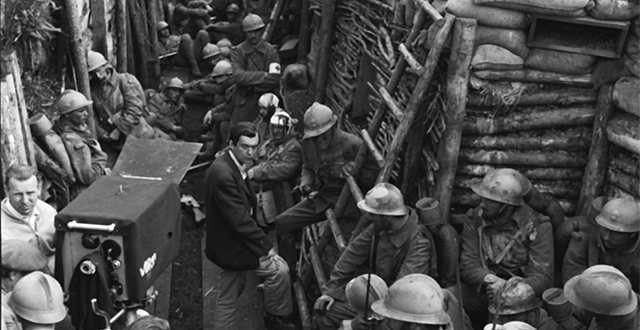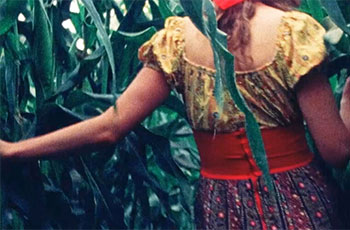
Out of the Vaults*: “Paths of Glory”, 1957
Meher Tatna 05/26/2020* An occasional series on films restored with the support of the HFPA.
Stanley Kubrick’s classic, Paths of Glory, which was declared "culturally, historically and aesthetically significant" by the Library of Congress in 1992, was restored by the UCLA Film and Television Archive. Restoration of the film was completed with the cooperation of MGM Studios and with funding from The Film Foundation and the Hollywood Foreign Press Association.
Preservation specialist, Bob Gitt, described the condition of the film pre-restoration: “Almost 90% of the original camera negative survived, though it did require many hours of preparation by the staff of the Cinetech laboratory to remove clumps of embedded dirt, to reinforce old splices and to repair torn and strained sprocket holes.” Their efforts brought this classic back to its original… glory.
Kirk Douglas does not have a producer credit on the film but was instrumental in getting the picture made by interceding with United Artists and accepting the leading role. In 1969, Douglas told film critic Roger Ebert, “There’s a picture that will always be good, years from now. I don’t have to wait 50 years to know that. I know it now.” He was referring to Stanley Kubrick’s 1957 WWI masterpiece Paths of Glory in which he played the lead role.
In the film, it is 1916 and the French and German armies are in a stalemate on the battlefield, dug in without gains on either side. In an opulent chateau where the generals live in luxury while strategizing the war, General Broulard (Adolphe Menjou) bribes his subordinate General Mireau (George Macready) into ordering an attack on the Germans that is doomed to fail. Colonel Dax (Douglas) commands the suicide mission. When the first wave sustains heavy casualties and fails to reach the German side, the second wave refuses to follow them into battle, causing Mireau to demand a court-martial of the entire regiment for cowardice. He is forced to accept three soldiers instead, seemingly picked at random. Only one (Joseph Turkel) is actually picked by lottery even though he participated in the battle; another (Timothy Carey) is chosen as he is a troublemaker; the last one (Ralph Meeker) is selected to prevent his testimony in a superior’s actions in a scouting mission. Dax, furious that his men are made scapegoats, defends them in their trial, but the outcome is preordained as no exculpatory evidence is allowed to be entered, and the men are executed. The audience never sees the face of the enemy except for a German singer who is forced to sing for the remaining troops in the last scene of the movie before they are recalled to the Front.
The movie is a fierce indictment, not only of war but the opportunism and hypocrisy it breeds. WWI caused eight million deaths, and the bad decisions of politicians and commanders and suicide missions of hapless troops are well recorded in history. Kubrick documents not only the banality but the cruel humor of the conflict, ably assisted by outstanding performances from his cast. Shooting in black and white, he gives a documentary-style experience to the audience, especially in the battle scenes as the mortar flies, explosions blast, and soldiers scream. That the face of the enemy is unseen except in the person of the scared young German girl made to sing The Faithful Hussar to the soldiers, a folk song that resonates with them as they are shown one by one in closeup, unaware that they are to return almost immediately to the hopeless war, offers a devastating ending to the film, leaving the audience in despair, left only to imagine their fate. In that sense, Dax is not really the hero of the film; it is the young men, and they are really young, who will go back to a war that is led by incompetent and venal men, themselves guilty of the cowardice they project onto their troops.
As an aside, Christiane Harlan, who played the singer, became the third Mrs. Stanley Kubrick in 1958. They were married 40 years until his death in 1999.
Douglas was instrumental in getting the movie greenlit at United Artists. Made at a time when it was more popular to celebrate war than to criticize it, both Kubrick and Douglas were aware that the film would be difficult to market. Douglas had told Kubrick, “Stanley, I don't think this picture will ever make a nickel, but we have to make it.”
In his 1988 autobiography, The Ragman’s Son, Douglas writes about how Kubrick tried to change the ending and presented him with a rewritten script when he arrived at the shoot in Germany. In that version, which Douglas called a catastrophe, there was a happy ending as the men’s death sentences were changed to 30 days in the guardhouse and Colonel Dax and General Rousseau went off arm in arm for a drink. He wrote:
“I called Stanley and [producer James] Harris to my room. “Stanley, did you write this?”
“Yes.” Kubrick always had a calm way about him. I never heard him raise his voice, never saw him get excited, or reveal anything. He just looked at you, through those big wide eyes.
I said, “Stanley, why would you do that?”
He very calmly said, “To make it commercial. I want to make money.”
I hit the ceiling. I called him every four-letter word I could think of. “You came to me with a script ... I love that script. I told you I didn't think this would be commercial. But I want to make it. You left it in my hands to put the picture together. I got the money based on that script. Not this shit!” I threw the script across the room. “We are going back to the original script, or we are not making the picture.”
Stanley never blinked an eye. We shot the original script. I think the movie is a classic. One of the most important pictures – possibly the most important picture – Stanley Kubrick has ever made.”
-KIRK DOUGLAS
It fell to Harris to explain to United Artists that the happy ending they were expecting was changed back to the original. He got around the expected confrontation by sending the entire final script to the studio without a memo of changes attached, assuming no one would actually read it. He was right.
The film was made for $900,000 (about $9 million today), of which Douglas’ salary was $350,000. Kubrick took no salary; he worked for a percentage of the profit. And Douglas was right – there was no profit. Despite rave critical notices, the movie didn’t make money, especially in the international market. It was banned in Spain, France, Germany, and Switzerland; Belgium required a foreword stating that the incidents in the movie had no bearing on the ‘gallantry of the French soldiers.’ The US banned it on all military bases. But Winston Churchill said the film was “a highly accurate depiction of trench warfare and the sometimes-misguided workings of the military mind.”
But Douglas was also right that the movie would stand the test of time. It is now considered a masterpiece, and many think it is Kubrick’s finest work. It was deemed ‘culturally, historically or aesthetically significant’ by the Library of Congress in 1992 and is included in the American Film Institute's 1998 list of the 400 movies nominated for the Top 100 Greatest American Movies.
Actor Leon Vitali, technical advisor to Kubrick for 30 years, assisted in the restoration process by obtaining the originals and approving final answer prints. It was restored using the original 35mm picture negative, a 35mm fine-grain master positive, and Kubrick’s personal 35mm print. A final answer print was produced using two prints that formerly belonged to Kubrick as a guide to making sure that the contrast and density of the new prints were correct. The soundtrack was rerecorded and cleaned up, producing a new 35mm magnetic track master and a new optical track negative.
The title of the film was taken from a stanza in Thomas Grey’s 1751 Elegy Written in a Country Churchyard which ends: ‘The paths of glory lead but to the grave.’
To finish, a little trivia: Charlton Heston turned down the role of Dax in order to star in Touch of Evil. And actor Timothy Carey was fired in the middle of shooting when he became disruptive and held up production. Then he faked his own kidnapping to get himself publicity. He was replaced by a double in the confession scene with a priest, the double’s back to the camera. He does not appear in the battle scene either.
HFPA